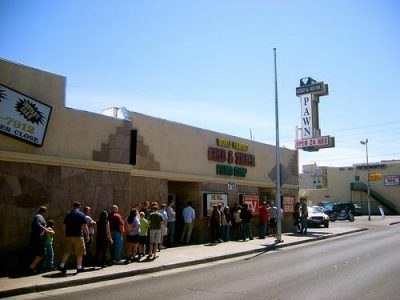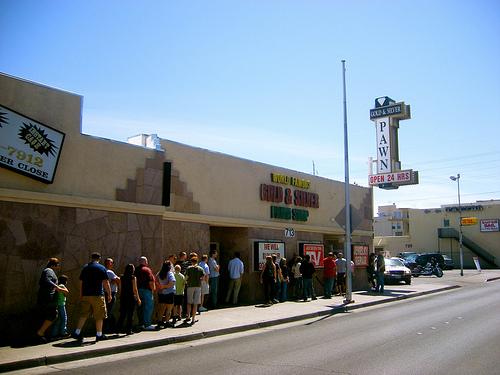Watch out Annie Leonard and the “The Story of Stuff!” Reality TV is on the stuff beat.
If you’ve missed reality shows like Pawn Stars, Storage Wars, and American Pickers, then you’ve missed a fascinating front in the expanding “new economy.”
These reality shows are an unwitting window in to the new green economy, showing just how cool and profitable it is to reuse and repurpose old stuff. Environmentalists know that reusing creates a “closed loop” in the production process, saving all the upstream inputs and keeping things out of landfills and incinerators. (For the full explanation, watch Annie Leonard’s excellent original Story of Stuff.)

The Gold & Silver Pawn Shop in Las Vegas teaches lessons on repurposing through the hit show “Pawn Stars.” CC photo by Pocheco.
Unfortunately, we must start our reality TV tour with the hoarders. Hoarding: Buried Alive and Hoarders dramatize the folks who compulsively fill their homes with stuff until health and human services professionals are called in. Stuff crams these homes from floor to ceiling. These shows baldly expose a convergence of dysfunctions: addiction, debt, overconsumption, and isolation. They’re truly gut-wrenching, and the only appropriate response seems to be a quick prayer and a click of the remote. It is impossible to watch without feeling like a horrible voyeur.
But moving on from the hoarders we meet the “pickers.” On Americans Pickers, two men drive around the country in a big van and knock on doors where they see houses overflowing with stuff. They wheel and deal and ultimately cart off a few choice items from these homes, leaving the homeowner a bit richer but still, usually, drowning in stuff.
The most riveting show is Storage Wars. Here, three men plus a husband-and-wife team bid on items in “foreclosed” storage units after glimpsing the contents for only a few minutes. Why only a few minutes, you might ask? One can only assume that storage warriors prefer a bit of drama and mystery built into their business model. (NPR’s This American Life also did a story on this phenomenon a few years ago.)
What goes largely unlamented on Storage Wars are the people losing the storage units. Who are they, and why did they stop paying the rent on the unit? Why were they storing this stuff in the first place, instead of keeping it in their homes? The “signs of the times” are invisible but present: was it a lost job, a foreclosed home? Was it a case of over-consumption, and the stuff just wouldn’t fit?
The tragedies of the old debt-based consumption economy stare us in the face as each unit’s yawning door is pulled open. But even as we lament this, the storage warriors zip into the opening like zealous entrepreneurs. They’re full of new life for old stuff.
These programs are just the tip of the iceberg wh>en it comes to stuff-based reality TV. There’s also Pawn Stars (the most popular show, featuring the colorful owners and customers of Gold & Silver Pawn Shop in Las Vegas), Hardcore Pawn (about Detroit’s biggest pawn shop) and Picker Sisters (Lifetime’s answer to the male American Pickers, it’s about two women who travel the country looking for things to repurpose for their funky home décor shop).
What can we make of the fact that livelihoods based on reusing and repurposing have risen to such prominence in American pop culture that they merit multiple reality TV shows?
For one thing, it’s encouraging that so many people who appear not to give a fig for the environment are on the cutting edge of reusing, recycling and repurposing. The transition to a new economy won’t get far if we can’t make our livelihoods in it. The good news is that there’s money to be made by keeping stuff out of landfills – and even money to be made by featuring this on TV!
We could also speculate that a robust secondary market means that we’re all a little less obsessed with the shiny and the new. Or, perhaps this is a temporary blip – and most folks are secretly dying to get back into the mall.
Oh America, you have woven a truly rich story of stuff. And now as we try to back out of over-consumptive madness into something more sustainable and healthy, we need everyone on board. Advocates for the new economy have something to learn from all the pickers, storage warriors, and pawn stars leading the way, and making a buck while doing it.
